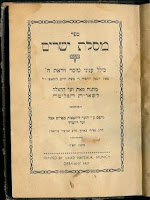Towards the end of the Amidah we say:
פְּתַח לִבִּי בְּתורָתֶךָ. וּבְמִצְותֶיךָ תִּרְדּף נַפְשִׁי
May my heart be open to your Torah. May my soul pursue your Mitzvos.
I’m on round two of going through the second volume of the Bilvavi Mishkan Evneh. A few nights ago I came across this:
If the Torah he has learned and the prayers he has prayed until today have not brought him to the state of feeling in his heart that Hashem is a real perceptible entity Whom it is pleasant to live with and cleave to, his Torah and mitzvos were only in the mind, but the heart was not functioning properly. (chapter three)
Yeah, this one brought me to a screeching halt. This is the real deal. If I’m don’t feel like davening, washing negel vasser, making a bracha, lighting neiros, learning, dressing tzenuah or doing chessed, it’s a problem. What if I do those things and still feel nothing? It must be that my heart isn’t open.
Each generation has their own specific Yetzer Hara. Not putting enough heart into Yiddishkeit just might be ours. There’s a cure, though. It might not be for everyone, but it’s worth a try and has helped me over the past year and a half.
The gemara in Kiddushin 30b says: Hashem has told Yisrael, “My children, I have created the Evil Inclination, and I have created the Torah as an antidote against it.” Again, each generation has their own specific Yetzer Hara. With that in mind, I think it’s safe to type that each generation is given specific seforim and teachers that are vessels of Torah containing the antidote we need against the Evil Inclination of our times.
Much as been written about the gadlus of the Bilvavi Mishkan Evneh seforim and their author, Rav Itamar Schwartz. I am, by no means, a talmud of his or his seforim. I’m simply more of an armchair or between-aliyos reader. I’m constantly amazed, even in the English, how clearly he gives over important concepts that I have seemed to have forgotten over the years and brings to light new mind-blowing ideas with such tangible everyday life examples. Even more importantly that opening my mind, my heart has begun be be opened again, as well. It’s been a slow process, but when I put in the effort, I’m a better Jew.
Building A Sancuary in the Heart isn’t overly intellectual, hippy-trippy, or feel-good-and-feel-frummer writing. Its’ success is due to the fact that the seforim speak to each person differently. In fact, the whole approach to Rav Schwartz’s teaching is very different that that of other Rabbeim. His Torah has been made available to everyone via the web. The seforim, mp3s and videos are all there, just waiting for you. If you don’t feel like the Jew you were several years ago, when Mitzvos and the idea of being close to Hashem seemed to be something you yearned for, then this might be the antidote you need.







